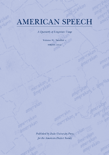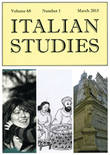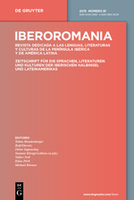
Rusin
Scope & Guideline
Exploring the Intersection of Culture and Knowledge
Introduction
Aims and Scopes
- Historical Studies:
The journal focuses on the historical narratives and events that have shaped the Rusin identity, including political, social, and cultural histories from various periods. - Linguistic Research:
There is a significant emphasis on the study of the Rusin language and its variants, exploring its evolution, semantics, and its interaction with other languages, particularly in bilingual contexts. - Cultural Identity and Ethnography:
Research on the cultural practices, beliefs, and identity of the Rusin communities is a core area, often examining folklore, traditions, and the socio-political representation of Rusins. - Interethnic Relations:
The journal addresses the interactions and relationships between the Rusins and neighboring ethnic groups, reflecting on historical and contemporary issues of nationalism, identity, and cooperation. - Educational and Textual Analysis:
Studies often include analyses of educational materials, literature, and historical texts that contribute to understanding the transmission of Rusin cultural values and historical narratives.
Trending and Emerging
- Digital Humanities and Big Data:
There is an increasing interest in utilizing digital tools and big data analysis to study historical narratives and cultural representations, reflecting a broader trend in humanities research. - Language Contact and Bilingualism:
Recent themes highlight the complexities of bilingualism and language contact, particularly in the context of Rusin speakers interacting with other ethnic groups, which is becoming a significant area of inquiry. - National Identity and Memory Politics:
The exploration of national identity, particularly in relation to memory politics and historical narratives, is gaining prominence, indicating a growing concern with how identities are constructed and remembered. - Transnational Perspectives:
Research is increasingly looking at Rusins within transnational frameworks, examining their roles and identities in broader geopolitical contexts, which suggests a shift towards more globalized analyses. - Social Media and Contemporary Discourse:
The examination of how Rusin identity and narratives are represented and discussed in social media platforms is emerging as a vital area of study, indicating a response to modern communication trends.
Declining or Waning
- Early Medieval Studies:
Research focusing on the early medieval period, particularly the formative years of the Rusin identity, seems to have decreased, possibly overshadowed by more contemporary topics. - Traditional Folklore Studies:
While folklore remains a part of the discourse, there has been a noticeable decline in papers specifically dedicated to traditional folklore, possibly due to a shift towards modern sociocultural analyses. - Soviet Era Historical Analysis:
Publications that concentrate on the Soviet period's impact on Rusin identity and culture have diminished, indicating a potential shift in focus towards more current socio-political issues. - Art Historical Studies:
Research related to the visual arts and their historical context within the Rusin culture has become less frequent, suggesting a waning interest in this area compared to other forms of cultural analysis.
Similar Journals

Ethnorema
Bridging disciplines to illuminate the richness of human experience.Ethnorema is a distinguished, peer-reviewed journal dedicated to the field of ethnography and cultural studies. Published by ETHNOREMA ASSOC since 2005, this Open Access journal has been instrumental in fostering scholarly dialogue and disseminating significant research in the study of diverse cultures and social practices. With an ISSN of 1826-8803, Ethnorema provides a vital platform for researchers, professionals, and students alike to engage with contemporary ethnographic studies and interdisciplinary approaches. The journal not only champions rigorous academic contributions but also emphasizes accessibility, ensuring that its content reaches a global audience. Located in Castelnuovo Scrivia, Italy, Ethnorema is committed to enriching the understanding of cultural dynamics and societal transformations through impactful research. As a resource that caters to an array of academic inquiries, it holds a crucial role in shaping the discourse within the humanities and social sciences.

Fontes Linguae Vasconum
Elevating Research in Linguistics and LanguageFontes Linguae Vasconum, published by GOV NAVARRA, DEPT CULT SPORT & YOUTH DIR GENERAL CULT-INST PRIN VIANA, stands as a pivotal academic resource in the field of Linguistics and Language studies. Established as an Open Access journal since 2007, it ensures wide dissemination of research findings and promotes collaborative dialogue among scholars, researchers, and students. With a growing impact factor reflected in its Q2 category ranking in Linguistics and Language for the year 2023 and an impressive standing in Scopus with a rank of #443 in Arts and Humanities, the journal serves as a significant platform for advancing knowledge derived from the rich linguistic heritage of the Basque language and beyond. The journal is dedicated to publishing high-quality research articles, reviews, and discussion pieces that explore diverse aspects of language, fostering connections between contemporary linguistic theories and their practical implications. Based in Pamplona, Navarra, Spain, Fontes Linguae Vasconum continues to evolve, providing researchers and academics with essential insights and a valuable reference in the vibrant field of linguistics.

AMERICAN SPEECH
Championing Innovative Scholarship in Language StudiesAMERICAN SPEECH, published by DUKE UNIVERSITY PRESS, stands as a premier journal in the fields of Communication and Linguistics, boasting a commendable Q1 rating in both disciplines as of 2023. With its ISSN 0003-1283 and E-ISSN 1527-2133, this scholarly publication offers a vital platform for innovative research and critical discussions surrounding language in American societal contexts. Covering a broad spectrum of topics from linguistic theory to sociolinguistic analysis, AMERICAN SPEECH addresses the nuanced dynamics of speech and language, making it an essential resource for researchers, professionals, and students alike. Although the journal is not open access, its high Scopus rankings reflect its influence and reach within the academic community, ranking #263 out of 1088 in Language and Linguistics and maintaining a respectable 75th percentile. As the discourse surrounding language continues to evolve, AMERICAN SPEECH remains at the forefront, engaging with contemporary debates and fostering a deeper understanding of the roles language plays in society.

LaborHistorico
Illuminating the Dynamics of Labor RelationsLaborHistorico is a distinguished academic journal published by the Universidade Federal do Rio de Janeiro, Faculdade de Letras, dedicated to the field of labor studies and historical research. Focusing on the dynamics of labor relations and their historical contexts, this journal aims to provide a platform for rigorous scholarship and innovative perspectives on the evolving nature of work. While it does not currently adopt an Open Access model, it remains committed to making relevant research accessible to its audience, which includes researchers, professionals, and students in the humanities and social sciences. With a dedication to fostering interdisciplinary dialogue, LaborHistorico offers its contributors and readers a vehicle for critical discussions and insights into labor history, making it an essential resource for anyone interested in understanding the complexities of labor through time.

Italian Studies
Uniting Perspectives on History, Language, and the ArtsItalian Studies, published by Routledge Journals, Taylor & Francis Ltd, stands as a distinguished academic platform in the fields of Cultural Studies, History, Linguistics, Language, Literature, and the Visual Arts. Established in 1937, this journal has fostered scholarly dialogue and innovation through its robust contributions and in-depth analyses that bridge historical and contemporary perspectives on Italian culture. With an impressive ranking in Q2 and Q3 quartiles across multiple categories, including Literature and Literary Theory, and a current impact factor reflecting its growing influence, Italian Studies serves as an essential resource for researchers, professionals, and students alike. Although not an open-access journal, it remains accessible via institutional subscriptions, ensuring that a wide audience can engage with its critically acclaimed research and articles. Located in the UK, Italian Studies continues to advance the understanding of Italy's rich cultural heritage, making it a vital cornerstone for those invested in the humanities and social sciences.

Slavia-Casopis pro Slovanskou Filologii
Illuminating the Path of Slavic Academic InquirySlavia-Casopis pro Slovanskou Filologii is an esteemed journal dedicated to the advancement of Slavic philology, published by the SLOVANSKY USTAV AKAD CESKE REPUBLIKY in the heart of the Czech Republic. With its ISSN: 0037-6736, the journal serves as a vital platform for scholarly exchange, embracing a rich academic tradition since its convergence years beginning in 2002. The journal has achieved notable recognition, with a Q3 ranking in Linguistics and Language and a Q2 in Literature and Literary Theory as of 2023, highlighting its contribution to these dynamic fields. Although it does not currently offer open access, its rigorous selection of articles ensures that it remains a crucial resource for researchers and practitioners alike, facilitating a deeper understanding of Slavic languages and literature. Scholars benefit from the journal's extensive research backdrop, enhanced by its current ranks in the Scopus database, underscoring its significant placement within the academic literature landscape. The editorial scope of Slavia promotes innovative inquiries that reflect cultural, historical, and theoretical perspectives endemic to Slavic studies, making it indispensable for professionals, students, and enthusiasts invested in the exploration of Slavic linguistic and literary heritage.

Acta Baltico-Slavica
Connecting Scholars Across Baltic and Slavic DisciplinesActa Baltico-Slavica, an esteemed academic journal published by the Polish Academy of Sciences, Institute of Slavic Studies, serves as a vital platform for the exploration of Slavic cultures, languages, and historical narratives. Since its transition to Open Access in 2014, the journal has fostered inclusivity and accessibility, allowing researchers, professionals, and students to engage with cutting-edge scholarship in the fields of History, Linguistics and Language, and Literature and Literary Theory. With a commendable impact as indicated by its category quartile rankings (Q2 in History and Literature, Q3 in Linguistics), and Scopus rankings reflecting its significance within the academic community, Acta Baltico-Slavica not only contributes to the rich tapestry of scholarship surrounding the Baltic and Slavic regions but also encourages interdisciplinary dialogue. The journal’s commitment to advancing knowledge across its fields of study makes it a prominent destination for scholarly discourse and research inquiry.

BULLETIN OF THE INSTITUTE OF HISTORY AND PHILOLOGY ACADEMIA SINICA
Fostering Dialogue Across Time and Language.BULLETIN OF THE INSTITUTE OF HISTORY AND PHILOLOGY ACADEMIA SINICA is a distinguished academic journal published by the Academia Sinica's Institute of History and Philology, based in Taiwan. Focused on the interdisciplinary fields of history, linguistics, archaeology, and religious studies, this journal provides a scholarly platform for researchers and professionals seeking to disseminate innovative findings and theoretical advancements. Despite its recent Q4 categorization in several areas including archaeology and linguistics, the journal is committed to fostering rigorous dialogue and enriching the academic community's understanding of historical and philological nuances. As an essential resource for those invested in the humanities, particularly within the context of Asian studies, it remains dedicated to enhancing visibility and accessibility to pivotal research. While currently not an open-access publication, it continues to shape the discourse within its field through concise contributions from credible scholars. Join the journal's ongoing mission to illuminate the complexities of history and language, bridging gaps across cultures and time.

Fluminensia
Illuminating the Intersection of Linguistics and LiteratureFluminensia, published by the University of Rijeka, Faculty of Philosophy, is a distinguished open-access journal that has been contributing to the fields of Linguistics and Literature since its inception in 1999. With an ISSN of 0353-4642 and an E-ISSN of 1848-9680, this journal offers rigorous peer-reviewed articles, fostering an engaging platform for researchers, professionals, and students alike. Recognized internationally, it holds a Q3 ranking in Linguistics and Language and a Q2 ranking in Literature and Literary Theory for 2023, reflecting its significant impact within these fields. Based in Croatia and serving a global academic community, Fluminensia aims to explore innovative theories and methodologies, promoting critical discourse and scholarly exchange. Researchers will find its broad scope inviting, bridging insights across various disciplines in the arts and humanities. Accessible to all, this journal continues to foster an inclusive academic landscape, ensuring that valuable research is widely disseminated and freely available.

IBEROROMANIA
Connecting Scholars through Innovative Research in Romance StudiesIBEROROMANIA, published by WALTER DE GRUYTER GMBH, stands as a pivotal journal in the fields of Linguistics and Language and Literature and Literary Theory. Since its inception in 1969, IBEROROMANIA has facilitated scholarly discourse by providing a platform for cutting-edge research that explores the complexities of Romance languages and their literatures. The journal is recognized for its valuable contributions, currently holding a Q3 quartile ranking in Linguistics and Language and a Q2 ranking in Literature and Literary Theory as of 2023. With its diverse scope spanning several years, including works from 1970 to 2024, IBEROROMANIA is pivotal for researchers, professionals, and students alike, fostering a deeper understanding of Romantic linguistic and literary frameworks. Although it does not provide open access, its impact in the Arts and Humanities is underscored by its Scopus rankings, reflecting a commitment to high-quality scholarship. For those dedicated to exploring the nuances of Romance languages and literature, IBEROROMANIA is an indispensable resource.